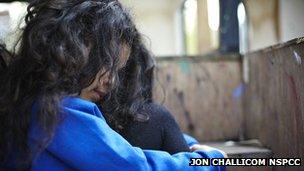Female genital mutilation victim was 'aged just seven'
- Published

From Monday a new NSPCC helpline will help protect girls at risk of ritual mutilation
A girl of seven was the youngest victim of female genital mutilation (FGM) treated by the NHS in the past two years, according to new data.
Some 1,700 women and girls were treated by specialist FGM clinics but this masks a bigger problem says the NSPCC.
A UK-wide helpline to protect girls at risk of ritual cutting, practised by some African, Middle Eastern and Asian communities, goes live on Monday.
The victims "are hidden behind a wall of silence", said Lisa Harker of NSPCC.
The helpline is run by NSPCC child protection experts who have had training and advice from experts who work with women and girls who have undergone this form of ritual mutilation.
Extreme pain
The charity describes the practice as "illegal and life-threatening" and says that it results in extreme pain as well as physical and psychological problems that can continue into adulthood.
Female genital mutilation, sometimes known as female circumcision has been illegal in the UK since 1985 - but still continues in secret, often carried out without anaesthetic.
Some communities from parts of Africa and the Middle East, from both Muslim and Christian traditions, believe it is a necessary part of becoming a woman, that it reduces female sex drive and therefore the chances of sex outside marriage.

The NSPCC says ritual mutilation is performed on girls as young as four (posed by model)
Sometimes girls are sent abroad to have it done. Sometimes it is done in the UK.
It involves the partial or total removal of the female genital organs, sometimes only leaving a small hole for urination or menstruation. The NSPCC says that victims are usually aged between four and 10 but some are younger.
Comfort Momoh, a midwife at Guys and St Thomas's Hospital in London, collated the figures from the specialist clinics.
She told BBC news that many women are not identified until they become pregnant and are examined by medical staff.
Others suffer recurrent urinary tract infections and abdominal pain.
"Many people are not aware they have had it done as it was carried out when they were babies."
'Anonymous'
The NSPCC says the free 24-hour helpline is aimed at anyone concerned that a child's welfare is at risk because of female genital mutilation, particularly teachers and medical staff, but they are also hoping that relatives will come forward.
They stress that callers can remain anonymous but information on children at risk will be passed to police and social services.
Ms Harker said: "There is also a huge pressure within these communities to keep quiet about female genital mutilation, with some people even being threatened with violence if they speak out.
"We want this helpline to be a safe space for families who are against their daughter having female genital mutilation but feel powerless to stop it. Anyone from these communities can speak to us to get advice and help about female genital mutilation without fear of reprisal."
Some 20,000 girls in England and Wales are thought to be at risk, according to government estimates, but there is a lack of accurate figures.
Ms Momoh hopes that another benefit of the helpline will be to "generate more robust information and data".
Crime prevention minister Jeremy Browne described the helpline as "a vital step towards eradicating this horrendous crime".
"It builds on the work we have already undertaken through our violence against women and girls action plan to raise awareness, identify potential victims and prevent this form of child abuse."
Det Ch Supt Keith Niven of the Metropolitan Police Service added: "This practice cannot be disguised as being part of any culture, it is child abuse and offenders will be relentlessly pursued."
- Published19 June 2013
- Published19 June 2013
- Published13 June 2013
- Published21 May 2013
- Published24 April 2013
- Published20 March 2013
- Published7 February 2013
- Published2 February 2013
- Published23 July 2012
- Published22 August 2010